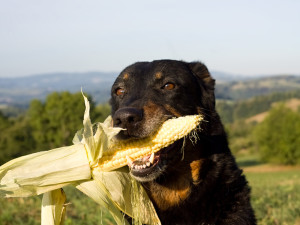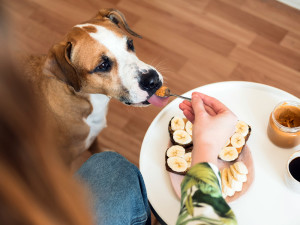Can Dogs Eat Tortilla Chips?
If they snag one or two at the potluck, it’s fine, but here’s why they shouldn’t get their own bowl to regularly chow down on.

share article
Every now and then, your dog may get their paws on a chip that falls to the floor, or look longingly at the snack board at your picnic, hoping for a bite of something crunchy. So, you may be wondering if it is OK to share tortilla chips with your pup.
While plain tortilla chips are not toxic to dogs and having one or two is fine, they do contain some ingredients that aren’t so good for them. Unless they get the occasional chip that falls off your plate, no, your dog should not be consuming tortilla chips as a regular snack.
Nutrition facts about tortilla chips for dogs
Basic tortilla chips are a delicious blend of salty, crunchy, satisfaction that make it hard to stop after just one bite. Recipes vary, but the most common ingredients found in tortilla chips are corn, vegetable oil, and salt. Homemade chips tend to be fried in oil to create that crunchy texture.
Other varieties may include different seasonings such as lime, chili powder, cheese powder, onion powder, and/or garlic powder. While each recipe varies slightly in its nutritional profile, most tortilla chips contain a mix of fat, carbohydrates, and sodium. While these nutrients are all necessary and healthy for dogs in the right proportions, tortilla chips tend to be heavy on the unhealthy proportions.
Are tortilla chips good for dogs?
Tortilla chips are not good for dogs. They contain only small amounts of many nutrients dogs need, like protein, while having large amounts of ingredients that can be unhealthy including:
Sodium: Sodium is a mineral found in common table salt. While some sodium is necessary for normal biological functions, too much can cause health problems. One salty meal or snack may make your pup feel extra thirsty and/or have to pee moreopens in a new tab. If they regularly have a high salt intake, this can contribute to more chronic problems like high blood pressure, and heart disease. A sudden large intake of salt, known as salt toxicity, or hypernatremia, can also cause more serious problems like swelling of the brain.
Fat: Fat can be a healthy source of energy for dogs and also contributes to good fur and skin health. However, too much fat can put dogs at risk for digestive upset, including vomiting and/or diarrhea, as well as more serious pancreatitisopens in a new tab. Eating high-fat foods on the regular can also add too many calories to your dog’s diet, leading to weight gain and related health problems.
Carbohydrates: Carbohydrates are also an important source of energy for dogs, especially whole grain carbohydrates that contain fiber and other valuable nutrients. However, too many simple carbohydrates, like those found in processed snacks, can lead to weight gain as well as related health problems like diabetesopens in a new tab and arthritisopens in a new tab.
Can dogs eat any chips?
No; it is not safe to assume that any and all chips are OK for dogs to eat. Chips have many different ingredients, and unless you know exactly what’s in a particular bag of chips, it would be hard to know if it is safe to share with your pup.
Common ingredients in chips can include garlic and onion powders for flavoring, both of which can be toxicopens in a new tab to dogs if they consume enough. Additionally, many varieties of chips are fried and contain a lot of high fat oil, which can cause digestive upset or even pancreatitis in some dogs.
Are tortilla chips completely safe for dogs?
Tortilla chips are not completely safe for dogs. Most are non-toxic, so if your dog ate a small piece of a chip they would most likely be fine. However, there are many compelling reasons not to share tortilla chips with your pup and to seek veterinary attention if they get into a large amount of chips. This includes:
High-salt content: Most tortilla chips are very high in salt. If your dog were to eat a large amount of these chips, they may be at risk for digestive upset or more serious side effects. If you do want to share a chip with your pup, seek out low-sodium, low-fat varieties.
High-fat content: Tortilla chips are typically fried in oil, making them high in fat. These kinds of high fat foods can cause digestive upset for dogs and also puts them at risk for more serious pancreatitis. You may be able to find lower fat, low-sodium, baked varieties of tortilla chips that would be safer to share with your pup.
High-carbohydrate content: Snacks that are high in simple carbohydrates put dogs at risk for weight gain. It is best to avoid giving your dog processed foods as a snack and stick to more whole grain, whole food options.
Other ingredients: While the basic tortilla chip recipe is simply corn, oil, and salt, there are many creative varieties on the market that contain lots of other ingredients. Some of these are not safe for your dog. For example, some brands of tortilla chips also contain onion opens in a new tabor garlic powderopens in a new tab, both of which can be toxic to dogs if they consume enough. And let’s not forget all the tasty toppings you may want to put on top of your chip. If your dog gets into a chip loaded with creamy quesoopens in a new tab, spicy chilis, or high-fat ground meat, there may be additional concerns to factor in.
Sharp edges: Tortilla chips can be sharp and pointy and can cause injuries to your dog’s mouth and throat as they attempt to gobble them down. They can also become choking hazardsopens in a new tab if your dog tries to eat a large piece of chip.
The bottom line: Can dogs eat human food?
Dogs can eat lots of human foods, and there are many safe and healthy optionsopens in a new tab that you can share with your dog. In general, it is best to share whole foods, like fresh fruits, vegetables, or plain, lean meats that don’t have a lot of added ingredients, seasonings, or oils. When it comes to snack foods like chips, there are a lot more variables in the ingredients that may be unhealthy or even toxic for your pup.
You’ll need to carefully evaluate all of the ingredients before sharing. If in doubt, be sure to contact your vet or a pet poison hotline before sharing a new, unknown food. It is also important to keep in mind that your dog should get the bulk of their diet from a complete and balanced dog food. This ensures that all of their nutritional requirements are met and that they are not at risk for any nutritional deficiencies.
Dogs who fill up on too many treats or table snacks may not get all of the nutrients they need to be their healthiest, or they may be unintentionally overfed if these snacks are higher in fat, sugar, or other unhealthy ingredients. A good guidelineopens in a new tab to follow is that all snacks and treats should be less than ten percent of your dog’s total intake. By sticking to that formula, you can focus on providing your dog with a high quality dog food diet that will meet all of their needs.
Other foods that are safe for dogs
Green beans opens in a new tabcan be a safe and healthy snack for pups.
Blackberries and other berriesopens in a new tab tend to be lower in sugar than other fruits, making them healthier options for dogs.
Shrimpopens in a new tab can also be OK in moderation.
Other foods that are dangerous
Chocolateopens in a new tab is always a no-no due to compounds that are toxic to dogs.
Ice creamopens in a new tab is not good for dogs and can contain unhealthy, as well as toxic, ingredients.
FAQs (People also ask):
How many tortilla chips can a dog eat?
Dogs should not eat tortilla chips as they contain many unhealthy ingredients for dogs.
Is it OK to give dogs tortilla chips?
While tortilla chips are usually not toxic, they are not healthy for dogs and should be avoided.
Why do dogs like tortilla chips?
Dogs may like the crunchy texture and the flavor of the fat in chips.
Can dogs eat other chips?
This depends on the chip, but many chips are not safe for dogs due to their ingredients.
Are tortilla chips safe for dogs?
While most are not toxic, they can make dogs sick, especially if they consume a lot.
References:

Dr. Amy Fox, DVM
Amy Fox, DVM is a small animal veterinarian in New York City. A lifelong animal lover, Dr. Fox studied biology in college and then worked as a veterinary nurse before pursuing veterinary school at Cornell University. She has worked in many different settings including shelter medicine, emergency medicine, general practice, and animal cruelty and forensics. She is especially interested in nutrition, preventative medicine and care for senior pets. Dr. Fox also enjoys writing about veterinary medicine and teaching. In her free time she loves to cook, garden, and go for long runs.
Related articles
- opens in a new tab
Can Dogs Eat Popsicles?
It’s already hot out there, after all.
- opens in a new tab
Can Dogs Eat Corn Cobs?
Why you should never let a dog make a chew toy out of this food at a barbecue.
- opens in a new tab
Can Dogs Eat Hot Dogs?
They may want a taste this summer, but read this first.
- opens in a new tab
Can Dogs Eat Corn?
A few kernels are fine—but keep it off the cob.
![Woman holding basket of cherries next to large brown dog.]() opens in a new tab
opens in a new tabCan Dogs Eat Cherries?
Find out if the yummy fruit is safe to share.
![Having breakfast and peanut butter with dog at home.]() opens in a new tab
opens in a new tabCan Dogs Eat Peanuts?
Peanuts are a great occasional protein-packed snack, but pay attention to this guidance.





